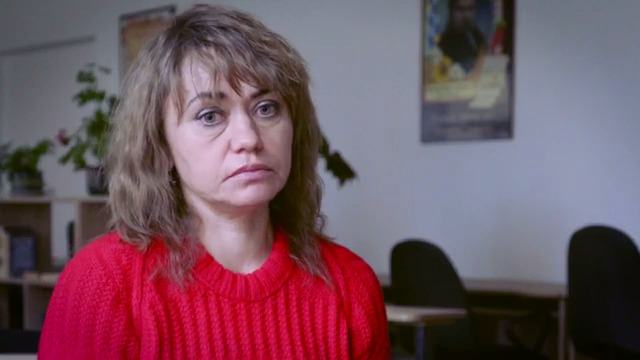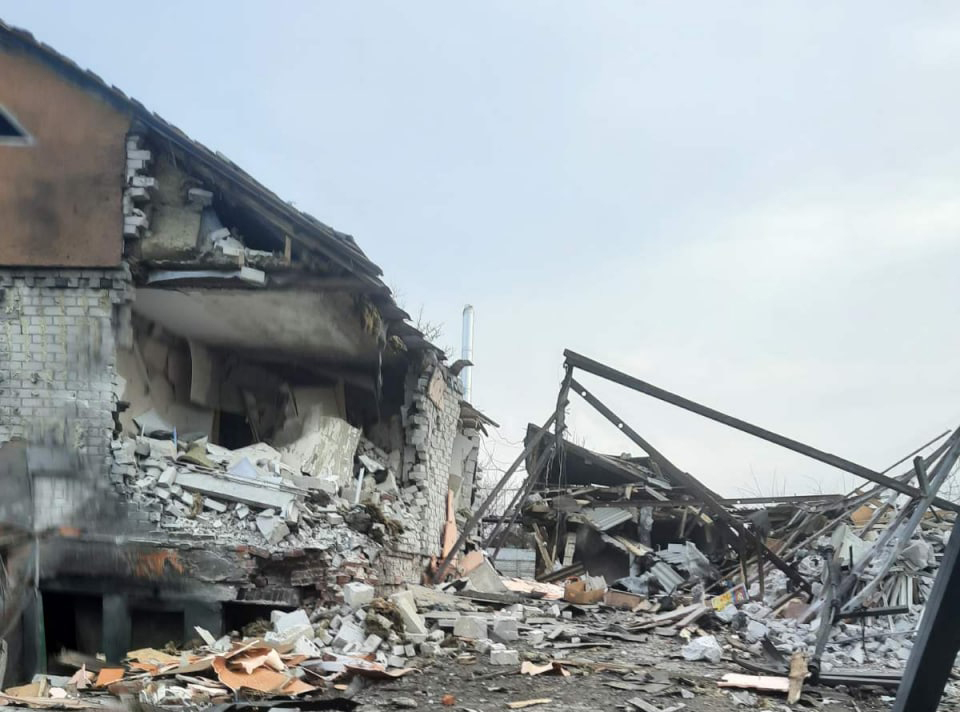I am from the Chernihiv region, Kulykivka village, 4 km. from Chernihiv. I was not ready for the war, did not expect it, or thought this was possible. And even after it came suddenly at night, for a long time, I could not accept that this was a war.
— How did the war of 2022 burst into your life?
— I woke up at night because the earth was trembling. I thought it might be war. I opened Facebook and didn't see anything. I began reassuring myself that there could be no war; it's impossible and just fear. At dawn, I went outside and saw that the air seemed electrified, and there was a feeling of despondence. I saw my client — I worked at home as a massage therapist. My client [a cook] walked to the morning shift to school to cook breakfast. After we met, she began to call everyone, asking what had happened. And they told her that bombs had been dropped on the airfield in Nizhyn, on a military unit. It was the war.
I live on the main street and saw a woman riding in zigzags on a bicycle and shouting: “Girls, the war started!”
It was like a horror movie. War... What to do, where to run? I am an orphan with no parents, only a younger brother. I called him in Kyiv and said: “Brother, where are you? Let's do something! What do we do?” He calmly replied, “I'm sleeping.” Only later I realized he knew everything since he was liable for military service. But he calmly answered me that he was resting. And I answered: “Brother, we must run. Let's go to my aunt's near Pryluky to hide.”
— Did you have difficulty accessing food?
— In the first hours, there were already huge queues in stores and gas stations. Then, in just a few hours, everything was swept away. So many cars, damaged by shelling and sealed with tape, came from Chernihiv. It was just the break of the day, and the evacuation from Chernihiv went through Kulykivka [a bypass road]. The wrecked cars often had “Children” written on them. All these cars stopped in our neighborhood.
The products were sold within a few days. Shops and ATMs were empty. We had no electricity, no cash, and there were huge queues. If supplies were brought, we stood in line for hours. However, you could get free milk. Farms had nowhere to sell their products, so they distributed the milk to the population.
— Have you witnessed the destruction of civilian facilities?
— We heard a roar from Chernihiv and heard airplanes. But they turned around over us and returned to Chernihiv. The city was heavily bombed, but the media did not cover this. Very quickly, a humanitarian catastrophe occurred in Chernihiv. The Russians bombed all the bridges.

There was no power, no water, and no gas. I kept in touch with my friends who stayed in Chernihiv. Many of them had their windows shattered by the shock wave. I offered to come to me, but they said they would not leave their homes. My acquaintances from one district of Chernihiv moved to another, but shells also flew there.
Then my brother asked me to take in refugees: seven adults, two dogs, and three young children. Terroborona [Territorial Defence Fofce] brought them in the car trunk.
Two were in the trunk with the dogs, and the rest were in the cabin. They were taken out at the last minute when all the bridges had already been blown up. Only one footbridge remained. Then everything froze, and an ambulance took them to that bridge. A rocket flew into their yard and got stuck in the ground. It was my brother's godfather, and he was shell-shocked. Chernihiv was attacked very often. The refugees wanted to show photos and tell me how it happened, but I replied that I couldn’t listen about digging people out from under the rubble with a knife. One of them was a paramedic. The emergency department where he worked was bombed in the first hours. After that, there were constant air raids and bombings. Some residents of Chernihiv were offended that the city was not protected and not ready for defense. Fortunately, God saved my village, but the places around us suffered.
People who ran away from Chernihiv were shelled and run over by the tanks. Volunteers who tried to rescue people were shot. The main hospitals were attacked.
There was an Orthodox church near me, and the pastor organized a volunteer center in his house. I went there to help. Minibusses were driving from Western Ukraine carrying humanitarian aid. I have a photo of what they brought: dumplings made by local women, pancakes, bacon, and preserves. They gave the food to us, then went to Chernihiv, took people, and brought them to our settlement. Someone had to be clothed, and someone needed food. Then they were taken to Kyiv, to a church shelter. I was there too when I had to leave. I didn't plan to run. I said that this was my land, home, and work; I would not go anywhere. Then I started writing evacuation lists. Unlike others who halted in this situation, I unlocked hidden reserves. It was necessary to clothe and feed refugees.

I remember well how five minibusses arrived from Chernihiv. Guys in bulletproof vests came out with walkie-talkies, and they said that people could take a walk for a few minutes and go to the toilet. We rushed to bring them tea, and as long as there was a humanitarian corridor, they would get back into the cars and go. There was such pride to see our guys. They were eagles, real men! Another episode I remember: there were so many people that they were sitting on the floor. No one got into the first car [in convoy] near the driver because people feared shelling. The roads were mined. Nizhyn was mined.
— How did you evacuate from your settlement?
— First, the villages nearby were shelled. They hit schools and other places. Our town was still OK. Then, one evening, just after volunteer work, my neighbor and I stood outside the house while my settlers walked their dogs. Suddenly we heard a whistle. The air-raid siren didn't work. Then there was such a roar and powerful explosion as if a five-story building across the street had fallen. Out of fear, we ran into the basement together, where the child had to be treated with Corvalol. It rumbled for two more nights because they shelled nearby farms and forests. Probably, there was a tip that someone was hiding in the forester's house. After that, we often heard a roar nearby. When I returned home for the first time in seven months to see what was happening there, I was told that Buryats were stationed near us, but the Armed Forces of Ukraine (APU) drove them out.
It is a great happiness that the APU recaptured the village. If the Russians went into it ...
At our village gas stations, there were huge barrels chock-filled with diesel. If a shell hit there... The Ukrainian military often passed through the village, and drones flew above. We understood that they [the Russians] saw all this, that a bypass road was passing by us. I knew, sooner or later, they were going to bomb us. It was only a matter of time. And when they started shooting nearby, my refugees said: “Oksana, you have five minutes to decide whether you are going or staying. You have an hour to get ready. As long as there is an opportunity to go to your aunt near Pryluky, you can leave in the car of an agricultural company that came on business.” I stood and thought, what to do? There was no one to consult. I knew it was similar in Chernihiv: first, they shot randomly and then delivered direct strikes.
Before that, we woke up three times in the night and hid in the toilet. When an airplane flies over you, it's a very unpleasant feeling. It seems to be crushing you with its mass, and you realize it’s impossible to hide in any basement. It's pointless to hide. So, I decided to go to my aunt. There is a remote village in the Prilutsky district, and no one would go there. In peacetime, I drove 140 km in 4 hours, but then it took two days. People I didn’t know took me through Bakhmach, gave me an apartment, and fed me. The director of the agricultural company was worried about me and called me. I was pleasantly surprised by how strangers took care of me. Then they said that early in the morning, while there was a corridor to Piryatin, we would try to break through and leave. The head of security will take us out.

I did not sleep all night. The head of security arrived. I naively took a massage table and everything you need for a massage. I thought I would come and treat my aunt. I still didn't quite understand the scale of what was going on. While you live in your world in a village, it isn't easy to get oriented. There was a hope that everything would end soon. You hope some seer said we would live to see the day when everything ends. And we live, but nothing changes. On the contrary, it only gets worse.
Early in the morning, a large tanker with milk drove to Piryatin from Bakhmach; we and a minibus followed. There was a drone in the minibus. We stopped in the field, in the hedgerow. We launched the drone while we stood and waited for what it would show. I was told this is the village of Dmytryevka, a crossroad, on one side, our people, and on the other, the orcs [Ukrainian name for the Russian army].
This place was under fire. A tank could appear at any moment, and that's it; people perish. That's when I got scared.
I stood and prayed because I understood this could be my last day. And then the head of security shouted: “Run to the car!” So we rushed to the car and took off, and behind us was a cisterna with milk. We zoomed along the hedgerow. I sat like a mouse, and he was all pale when I looked. We saw burnt cars on our way.
— What prompted you to leave Ukraine?
— The head of security, who used to work for the police, said I had better leave. After all, nothing holds me: neither family nor children. Orcs can come anytime, take our passports, and send us to the Urals. It is not known when this will all end. Therefore, he took his whole family out. I told him I had no money and had never been abroad. He replied that it was better there than here under the bombs. When it is good — come back. This conversation prompted me to make a decision. In our region, everyone clings to their homes and their land. It was a desperate move — come what may. I don't need an apartment or renovation. The main thing is to stay alive.
 The article was prepared by the Kharkiv Human Rights Protection Group with the support of the "
The article was prepared by the Kharkiv Human Rights Protection Group with the support of the "


